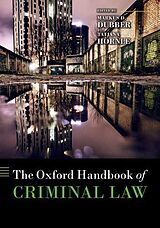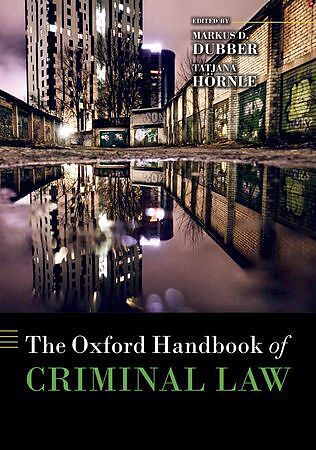The Oxford Handbook of Criminal Law
Einband:
Fester Einband
EAN:
9780199673599
Untertitel:
Englisch
Genre:
Strafrecht
Autor:
Markus D.; Hornle, Tatjana Dubber
Herausgeber:
Oxford Academic
Anzahl Seiten:
1232
Erscheinungsdatum:
27.11.2014
ISBN:
978-0-19-967359-9
Providing scholars with a comprehensive international resource, a common point of entry into cutting edge contemporary research and a snapshot of the state and scope of the field, The Oxford Handbook of Criminal Law takes a broad approach to its subject matter - disciplinarily, geographically, and systematically.
Zusammenfassung
The Oxford Handbook of Criminal Law reflects the continued transformation of criminal law into a global discipline, providing scholars with a comprehensive international resource, a common point of entry into cutting edge contemporary research and a snapshot of the state and scope of the field. To this end, the Handbook takes a broad approach to its subject matter, disciplinarily, geographically, and systematically. Its contributors include current and future research leaders representing a variety of legal systems, methodologies, areas of expertise, and research agendas. The Handbook is divided into four parts: Approaches & Methods (I), Systems & Methods (II), Aspects & Issues (III), and Contexts & Comparisons (IV). Part I includes essays exploring various methodological approaches to criminal law (such as criminology, feminist studies, and history). Part II provides an overview of systems or models of criminal law, laying the foundation for further inquiry into specific conceptions of criminal law as well as for comparative analysis (such as Islamic, Marxist, and military law). Part III covers the three aspects of the penal process: the definition of norms and principles of liability (substantive criminal law), along with a less detailed treatment of the imposition of norms (criminal procedure) and the infliction of sanctions (prison law). Contributors consider the basic topics traditionally addressed in scholarship on the general and special parts of the substantive criminal law (such as jurisdiction, mens rea, justifications, and excuses). Part IV places criminal law in context, both domestically and transnationally, by exploring the contrasts between criminal law and other species of law and state power and by investigating criminal law's place in the projects of comparative law, transnational, and international law.
Autorentext
Markus D. Dubber is Professor of Law at the University of Toronto. Dubber's scholarship has focused on theoretical, comparative, and historical aspects of criminal law. His publications include Criminal Law: A Comparative Approach (with Tatjana Hörnle), Foundational Texts in Modern Criminal Law, Handbook of Comparative Criminal Law, Modern Histories of Crime and Punishment, The New Police Science: The Police Power in Domestic and International Governance, The Police Power: Patriarchy and the Foundations of American Government, Criminal Law: Model Penal Code and Victims in the War on Crime: The Use and Abuse of Victims' Rights. Tatjana Hörnle is Professor of Criminal Law, Comparative Criminal Law, and Penal Philosophy, Humboldt University of Berlin. She writes mainly about substantive criminal law and sentencing and about the foundations of the criminal law in moral and political philosophy and constitutional law. In addition to numerous articles in German and international law journals, Professor Hörnle has published on proportionality in sentencing, on offensive conduct, on punishment theories and on freedom of will and culpability.
Zusammenfassung
The Oxford Handbook of Criminal Law reflects the continued transformation of criminal law into a global discipline, providing scholars with a comprehensive international resource, a common point of entry into cutting edge contemporary research and a snapshot of the state and scope of the field. To this end, the Handbook takes a broad approach to its subject matter, disciplinarily, geographically, and systematically. Its contributors include current and future research leaders representing a variety of legal systems, methodologies, areas of expertise, and research agendas. The Handbook is divided into four parts: Approaches & Methods (I), Systems & Methods (II), Aspects & Issues (III), and Contexts & Comparisons (IV). Part I includes essays exploring various methodological approaches to criminal law (such as criminology, feminist studies, and history). Part II provides an overview of systems or models of criminal law, laying the foundation for further inquiry into specific conceptions of criminal law as well as for comparative analysis (such as Islamic, Marxist, and military law). Part III covers the three aspects of the penal process: the definition of norms and principles of liability (substantive criminal law), along with a less detailed treatment of the imposition of norms (criminal procedure) and the infliction of sanctions (prison law). Contributors consider the basic topics traditionally addressed in scholarship on the general and special parts of the substantive criminal law (such as jurisdiction, mens rea, justifications, and excuses). Part IV places criminal law in context, both domestically and transnationally, by exploring the contrasts between criminal law and other species of law and state power and by investigating criminal law's place in the projects of comparative law, transnational, and international law.
Inhalt
Introduction
I. Approaches and Methods
1: Mariana Valverde and Pat O'Malley: Criminology
2: Bennett Capers: Critical Race Theory
3: Talia Fisher: Economics
4: Prabha Kotiswaran: Feminist Studies
5: James Whitman: History
6: Simon Stern: Literature
7: Leo Zaibert: Philosophy
8: Shai Lavi and Galia Schneebaum: Sociology
9: Mireille Hildebrandt: Technology
II. Systems and Models
10: Heikki Pihlajamäki and Mia Korpiola: Canon Law
11: Val Napoleon and Hadley Friedland: Indigenous Law
12: Sylvia Tellenbach: Islamic Law
13: Arnold Enker: Jewish Law
14: Stephen Thaman: Marxist and Soviet Law
15: Rain Liivoja: Military Law
III. Aspects and Issues
A. Foundations
16: Emmanuel Melissaris: Theories of Crime and Punishment
17: Lindsay Farmer: Codification
18: Alejandro Chehtman: Jurisdiction
19: Benjamin Berger: Constitutional Principles
B. Substantive Criminal Law
(i) General Part
20: Vincent Chiao: Actus Reus
21: Carl-Friedrich Stuckenberg: Causation
22: Thomas Weigend: Mens Rea
23: Michael Cahill: Inchoate Offenses
24: James Stewart: Complicity
25: Susanne Beck: Corporate Criminal Liability
26: Ulf Neumann: Necessity and Duress
27: Victoria Nourse: Self-Defense
28: Vera Bergelson: Consent
29: Christoph Safferling: Insanity and Intoxication
(ii) Special Part
30: Tatjana Hörnle: Rechtsgut and the Harm Principle
31: Guyora Binder: Offenses Against the Person: Homicide
32: James Chalmers: Offenses Against the Person: Assault
33: Vanessa Munro: Offenses Against Sexual Autonomy
34: Stuart Green: Offenses Against Property
35: Beatrice Brunhöber: Drug Offenses
36: Kent Roach: Terrorism
37: Sam Buell: 'White Collar' Crimes
38: Darryl Brown: Public Welfare Offenses
C. Criminal Process
39: Máximo Langer: Models of the Criminal Process
40: Frank Meyer: Discretion
D. Criminal Sanctions
41: Nora Demleitner: Types of Punishment
42: Erik Luna: Sentencing
43…

Leider konnten wir für diesen Artikel keine Preise ermitteln ...
billigbuch.ch sucht jetzt für Sie die besten Angebote ...
Die aktuellen Verkaufspreise von 6 Onlineshops werden in Realtime abgefragt.
Sie können das gewünschte Produkt anschliessend direkt beim Anbieter Ihrer Wahl bestellen.
Loading...
Die aktuellen Verkaufspreise von 6 Onlineshops werden in Realtime abgefragt.
Sie können das gewünschte Produkt anschliessend direkt beim Anbieter Ihrer Wahl bestellen.
| # | Onlineshop | Preis CHF | Versand CHF | Total CHF | ||
|---|---|---|---|---|---|---|
| 1 | Seller | 0.00 | 0.00 | 0.00 |
